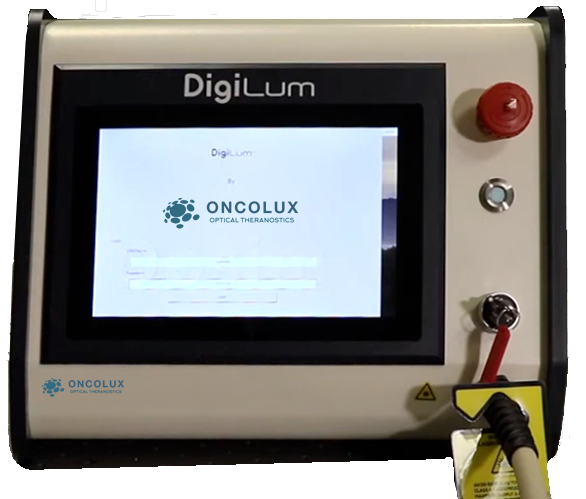Five Dreaded Words
These are
to every cancer surgery patient
We didn't get it all
Surgical oncologists perform a delicate balance, completing tumor resection while aiming to preserve healthy tissue and functionality.
In these delicate procedures, some cancer gets missed, and some are deemed unresectable due to important local anatomical features and structures.
Either way patients left with residual cancer following surgery will generally have a poorer prognosis.
No one wants this outcome, and we believe it doesn’t need to be this way…..
OncoLux’s new Optical Theranostic system combines intraoperative enhanced visualization of residual cancer with optical photodynamic therapy, allowing surgeons to
See and treat residual cancer in-situ
to ensure better outcomes.
The Data Tells us we Need to Improve the Precision of Cancer Resection



Breast Conservation Surgeries (BCS)
Up
to
35%
15-35% of BCS lumpectomies require a second surgery which often presents increased risk of complications ²
Transurethral Resection of Bladder Tumor (TURBT)
30-50%
of TURBT resections are incomplete, contributing to a higher risk of residual disease, early recurrence, and increased mortality¹
Radical Prostatectomies (RP)
25%
of RP procedures result in positive surgical margins, leading to a 2 to 3 fold increased in risk of biochemical recurrence³



1. A randomized, controlled trial of Cavity Shave margins in breast cancer. Chagpar, A. B et al. (2015). New England Journal of Medicine, 373(6)
2. Quality of diagnostic staging in patients with bladder cancer: A process-outcomes link. K Chamie, et al. 3, 2015, Cancer, Vol. 121
3. Frequency of Positive Surgical Margin at Prostatectomy and Its Effect on Patient Outcome. K. Iczkowski, M. Scott. Prostate Cancer, Vol. 2011
- 1. A randomized, controlled trial of Cavity Shave margins in breast cancer. Chagpar, A. B et al. (2015). New England Journal of Medicine, 373(6)
2. Quality of diagnostic staging in patients with bladder cancer: A process-outcomes link. K Chamie, et al. 3, 2015, Cancer, Vol. 121
3. Frequency of Positive Surgical Margin at Prostatectomy and Its Effect on Patient Outcome. K. Iczkowski, M. Scott. Prostate Cancer, Vol. 2011
A new theranostic system using photodynamic therapy aims to effectively target residual disease in surgical oncology, addressing the limitations of intraoperative radiation therapy.
Enabling SMARTER,
More EFFICIENT,
More EFFECTIVE,
TISSUE VISUALIZATION
......all without the use of an imaging agent
Enabling SMARTER,
More EFFICIENT,
More EFFECTIVE,
TISSUE VISUALIZATION
all without the use of an imaging agent
AI POWERED - INTUITIVE OUTPUT
No DYE
REAL-TIME

INCREASED PRECISION
intraoperative tissue insights increase margin accuracy
SEAMLESS FIT w/WORKFLOW
intra-operative efficiency require fewer resources
COST SAVINGS
of secondary operations & additional treatments
better outcomes
fewer complications, re-operations, radiation therapy, better functional outcomes

Real-time imaging during prostatectomy could improve the odds of preservation of function and reduce recurrence for 90,000 men in the U.S. per year.

60% reduction in the breast cancer positive margin rate nationwide could avoid reoperations for 30,000 women annually.

Real-time bladder resection imaging could avoid 70,000 repeat TURBT procedures per year in the U.S.
Real-time imaging during prostatectomy could improve the odds of preservation of function and reduce recurrence for 90,000 men in the U.S. per year.
60% reduction in the breast cancer positive margin rate nationwide could avoid reoperations for 30,000 women annually.
Real-time bladder resection imaging could avoid 70,000 repeat TURBT procedures per year in the U.S.
OncoLux is aligned with the OR of the future
REAL-TIME
Easy to interpret tools to visualize cancer tissue in real-time during surgery and enable faster decisions
DATA

The future of surgery is DIGITAL – real-time information to surgeons to enhance intraoperative decision-making
PERSONALIZED

Accurate margin data allows customization of the surgical procedure to each patient’s needs
ROBOTICS

Platform technology presents ability to integrate imaging into robotics surgical procedures
Learn More about OncoLux’s Technology and Products

AURORA™
OncoLux’s Multispectral AF Imaging Technology provides for target tissue identification through the detection of intrinsic biomolecular markers

DigiLum™

